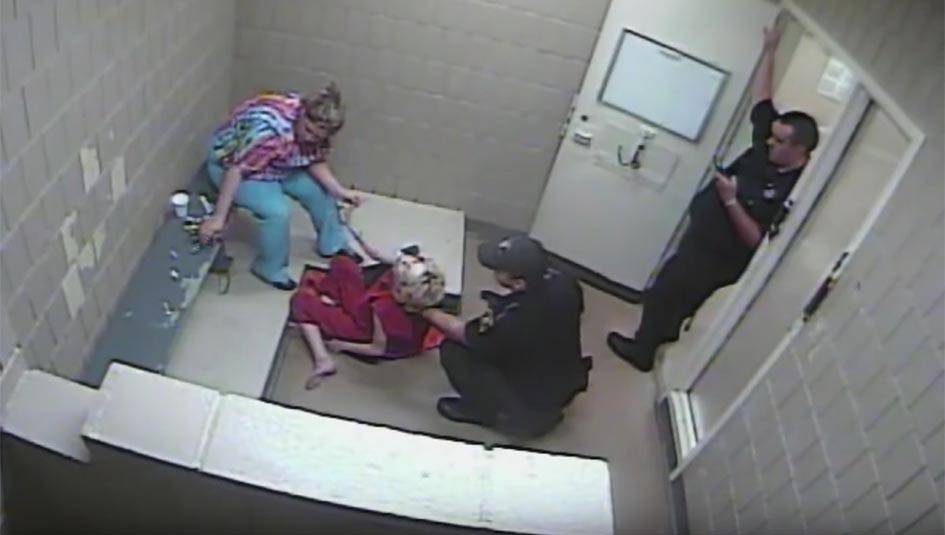Morgan Angerbauer Needlessly Died from DKA in Jail

Commentary
The parents of a woman with Type 1 diabetes posted a video of her death from diabetic ketoacidosis (DKA) in an Arkansas jail cell to raise awareness of medical maltreatment in the prison system.
According to a report in the Texarkana Gazette, the video shows the last moments of the life of Morgan Angerbauer, who grew unresponsive and then seemingly slipped into a coma before dying . The video’s timestamp also contradicts the timeline provided in an official report by investigators of the efforts to try and save her.
Read more: Seeking Blame in Morgan’s Death
Angerbauer’s death is a tragic example of the shortcomings of medical care for Type 1 diabetes in the U.S. penal system. The young woman’s descent into fatal DKA most likely began long before the time shown on the video.
Records show Angerbauer was booked at a Texarkana jail on June 28, 2016 for violations of her probation for a nonviolent drug offense. The next day, she was registering blood sugar readings over 400 and 500, which probably meant she was already generating ketones in the bloodstream. Despite this, she was never taken to the hospital for treatment. Her blood sugar levels did go down on the morning of June 30th, as a nurse registered her blood sugar level as 74 mg/dL.
Read more: A DKA Death in Jail.
Those incarcerated often must wait hours for blood sugar readings or insulin dosing. At 4:30 p.m., it was recorded that Angerbauer had missed “refused” to have her blood sugar levels checked; however, it is unclear if this means she actively refused. The Gazette report states that a report of “refusal” could be literal, or it could mean that someone was unresponsive or asleep during the visit. A person with diabetes with high blood sugar readings or ketones in the blood stream (or who is experiencing low blood sugar readings, for that matter) can appear lethargic, incoherent, and defiant.
(Click here to see the video. Warning – it is graphic and disturbing.)

Angerbauer asked to have her blood sugar levels checked a half hour later, but the nurse, Brittany Johnson, refused. Angerbauer then began pleading for help until sometime between 1 a.m. and 2 a.m., according to a correctional officer on duty. She then went silent, but no one checked on her until sometime in the hour of 4 a.m.
And here is where the official record and the video timestamp diverge. An investigation revealed that the officer who reported Angerbauer go silent had filled in times for medical tasks before they actually were completed, so there is no accurate written record.
Also, official reports of the incident diverge from the timestamp on the cell’s security camera video. Johnson says she went into Angerbauer’s cell to provide treatment at 4:40 a.m., and that paramedics arrived at 5:07 a.m. However, the video shows the nurse entered Angerbauer’s cell at 4:13 a.m., and spent much of that time unsuccessfully taking blood pressure and blood sugar readings. Correctional officers can be seen with their cell phones out during that time, but it appears no one called 911 until a correctional officer reported doing so at 4:57 a.m.
The lawyer for Angerbauer’s parents says that if help had been called earlier in that critical hour, Angerbauer might be alive today. It’s also true, however, that she probably should have received medical treatment hours, if not a day, earlier. There was ample time to save her before that 30-minute window.
At 5:10 a.m., Johnson “scratches her head and closes Angerbauer’s eyes,” according to the Gazette report. She is now on trial for negligent homicide, and has plead not guilty.
It is here that we must diverge from strict reporting, for reporting such a tragedy without a suggestion for how to work towards avoiding similar tragedies seems like journalistic malpractice.
The Type 1 diabetes community has done an extremely good job organizing and advocating for those who are actively engaged in their Type 1 diabetes care. Now might be a good time to advocate for those who might otherwise be overlooked.
This includes the incarcerated. If you would like to improve the health care of those in jails or prisons, consider working with an organization like The Center for Prisoner Health and Human Rights to advocate for better health care in the U.S. correctional system. Also, certified diabetes educators and diabetes activists might consider offering courses in blood sugar management and the symptoms of DKA and hypoglycemia for local jail and prison officials.
With the level of diabetes care options available in the U.S., there is no reason another person with diabetes should die in a cell from untreated high blood sugar.
Thanks for reading this Insulin Nation article. Want more Type 1 news? Subscribe here.







